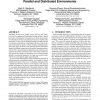Free Online Productivity Tools
i2Speak
i2Symbol
i2OCR
iTex2Img
iWeb2Print
iWeb2Shot
i2Type
iPdf2Split
iPdf2Merge
i2Bopomofo
i2Arabic
i2Style
i2Image
i2PDF
iLatex2Rtf
Sci2ools
117
click to vote
SIGMETRICS
2002
ACM
2002
ACM
Modeling and analysis of dynamic coscheduling in parallel and distributed environments
Scheduling in large-scale parallel systems has been and continues to be an important and challenging research problem. Several key factors, including the increasing use of off-the-shelf clusters of workstations to build such parallel systems, have resulted in the emergence of a new class of scheduling strategies, broadly referred to as dynamic coscheduling. Unfortunately, the size of both the design and performance spaces of these emerging scheduling strategies is quite large, due in part to the numerous dynamic interactions among the different components of the parallel computing environment as well as the wide range of applications and systems that can comprise the parallel environment. This in turn makes it difficult to fully explore the benefits and limitations of the various proposed dynamic coscheduling approaches for large-scale systems solely with the use of simulation and/or experimentation. To gain a better understanding of the fundamental properties of different dynamic cos...
Dynamic Coscheduling | Hardware | Parallel Computing Environments | Parallel Systems | SIGMETRICS 2002 |
Related Content
| Added | 23 Dec 2010 |
| Updated | 23 Dec 2010 |
| Type | Journal |
| Year | 2002 |
| Where | SIGMETRICS |
| Authors | Mark S. Squillante, Yanyong Zhang, Anand Sivasubramaniam, Natarajan Gautam, Hubertus Franke, José E. Moreira |
Comments (0)

